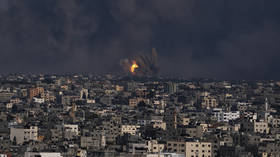2008 crisis sage warns of new global economic shock

Global financial markets are for now underestimating the threat of a “massive conflict" throughout the Middle East, renowned economist and New York University professor Nouriel Roubini has warned.
In an interview with Bloomberg on Thursday, he said that most investors believe Israel “has no choice but go into Gaza and get rid of Hamas,” pricing in a baseline scenario in which “Israel occupies Gaza, it’s going to get ugly, but the conflict remains contained.”
However, Roubini, who predicted the financial crisis of 2008-09 and was nicknamed ‘Doctor Doom’ by Wall Street, stressed that there is a “downside scenario” in which Iran and Lebanon get involved, prompting a conflict to flare up between Israel and Iran.
According to the economist, if “Israel tries to destroy Hamas, Iran that is a major backer of Hamas decides to unleash Hezbollah in Lebanon, and then you have the second front in Lebanon, maybe a third one in the West Bank. And at that point Israel will have to attack Iran.”
In this case, the supply of oil from the Gulf region would be disrupted and “you get a spike in oil prices and the economic impact would be huge,” he said, adding that “it’s not the baseline scenario, but it’s a risk.”
A surge in oil prices would trigger a “stagflationary shock” and create a “huge dilemma for central banks,” Roubini warned.
Global oil prices jumped by about 4% this week as renewed hostilities between Israel and armed Palestinian groups threaten the stability of the Middle East. The international Brent benchmark was hovering around $86 per barrel on Thursday, while US West Texas Intermediate crude was trading around $83 per barrel.
The latest flare-up began early on Saturday, when armed Palestinian groups launched a surprise attack on multiple locations along the Gaza border, with Israel launching a counteroffensive in response.
For more stories on economy & finance visit RT's business section













